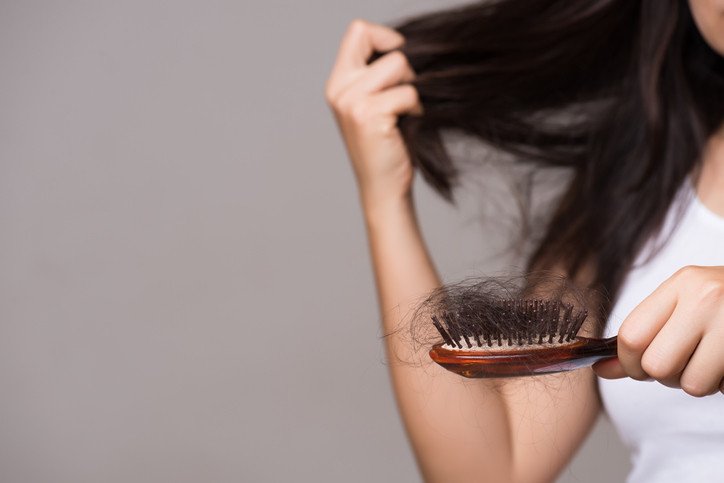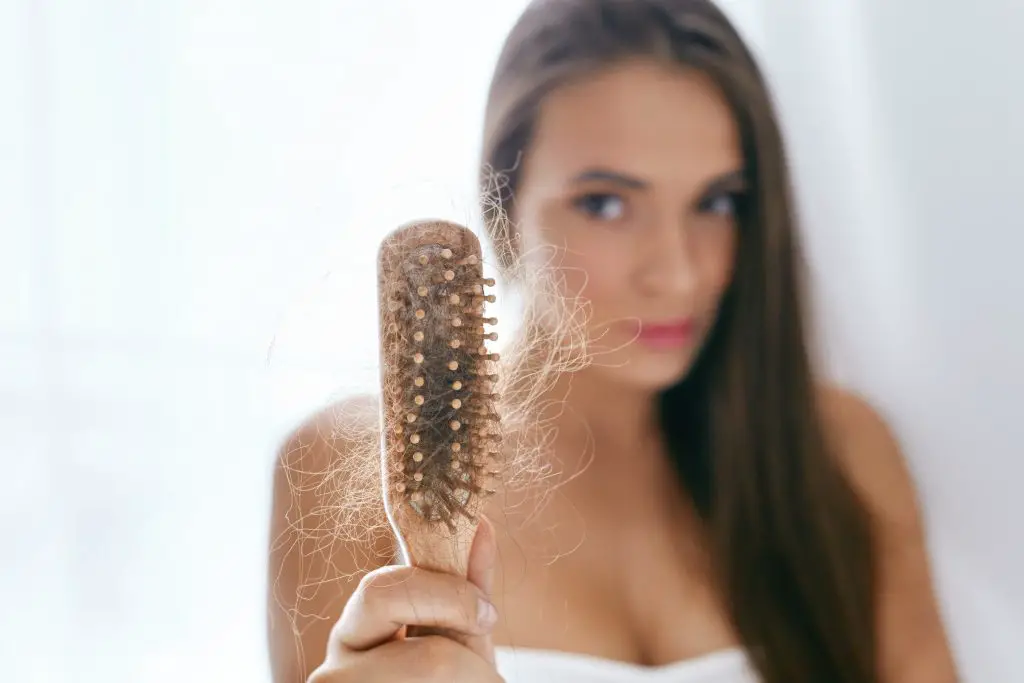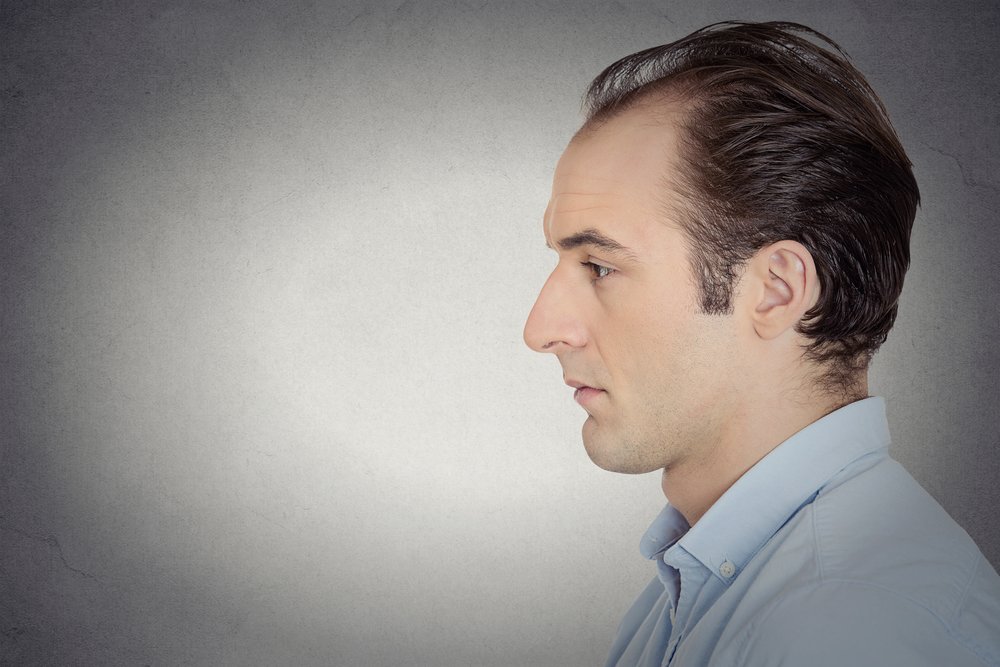
Page Contents
Hey ladies, we know that you suffer from hair loss too. But maybe you don’t know that you are suffering from hair loss. Maybe you think it is normal for your hair to be thinning. That isn’t the case. As a woman, there are things that you should be looking out for when it comes to hair loss.
Not only should you be watching out for signs of hair loss but you should also look for other none hair loss symptoms that accompany the hair loss. What are the signs of hair loss in women?
- Handfuls of Hair
- Overall Thinning
- Bald Spots
- Complete Loss
We also want to talk about the different types of hair loss that affect women as well as how to tell if your hair loss is pointing to a more serious condition. By the end of this article, you should have a pretty good knowledge base for hair loss in women and what to watch out for.
Signs of Hair Loss
Women tend to lead pretty busy lives. They are mothers, wives, employees, bosses, among many other things. Being busy tends to blind us to what is going on with us physically. It is important to pay attention to our bodies when they are trying to tell us something.
There are signs of hair loss in women. Some of them are easy to ignore or blame on something else until it becomes a glaring problem. If you are experiencing any of these signs then you should do something. Try to figure out the underlying problem, visit your doctor, or try some natural remedies.
Handfuls of Hair
While you might think that this sign is pretty obvious, it is actually easy to miss. Brushing your hair absent-mindedly could cause you to miss this early sign of hair loss. Over time you won’t be able to ignore it anymore as you start running your fingers through your hair and clumps of hair come out.
Once you notice what is going on you can start to do something about it. This sudden and large loss is actually pretty common after trauma. It could be emotional trauma or physical trauma. If you have experienced anything that is serious enough to cause hair loss you need to see a doctor.

Overall Thinning
Overall thinning is the most common type of hair loss among women and can be caused by a number of things. Stress, genetics, hormonal loss, and over-styling are among the usual suspects. This is similar to a receding hairline in men or a gradual bald spot.
Women tend to at first notice the part of their hair becoming larger. There are things that can be done about this loss depending on what is causing it. Genetics tends to be a more permanent situation while some of the other causes can be stopped and reversed to a point.
Related Reading
Bald Spots
This type of loss may not catch you by surprise because your scalp will typically let you know that it is happening. If you start seeing bald spots you may have felt pain or itchiness in that area before the bald spot showed up.
The cause of this is not as clear. If you are noticing this sign of hair loss then you might want to schedule an appointment with your dermatologist.
Complete Loss
This is a pretty serious loss and is likely due to a more serious underlying condition. While chemotherapy treatments are the number one cause of complete hair loss, there are other medical conditions, medications, or treatments that can cause this.
Depending on the cause, the loss could be permanent. There are many times that if the hair does grow back it will be patchy or very thin and whispy. Your doctor might be able to help with this however, you may just have a permanent loss.
Types of Hair Loss
There are different types of hair loss that come with different symptoms and treatments. Having a general knowledge of the types, symptoms, and causes will help you determine what is causing your loss and your first steps in treating it.
Alopecia Areata
This is the type of hair loss that can cause those painful bald spots we were talking about earlier. If you notice the spots or your hair getting patchy then it might be a time to see a doctor.
Alopecia areata is actually an autoimmune condition. It isn’t something that you can treat yourself but will need the guidance of a medical professional and maybe a specialized diet. There is a school of thought that says the condition may resolve by itself within a year. However, hair loss could be there to stay.
It is still a good idea to talk to your doctor.
Androgenetic Alopecia

This is the type of hair loss that comes from your genes. In men, you may recognized it as male pattern baldness. Women do have a name for their condition. It is called female pattern baldness.
As we said above, women see this type of loss in the part of their hair rather than the hairline or the back of the head. There is nothing that can be done about this loss. But the good news is that hair loss is slow with this type of loss.
Traumatic Alopecias
While this can be caused by any type of trauma, it is most common as a result of over-styling. Using too much color, getting too many perms, or the extreme use of curling irons or straighteners can cause your hair to fall out.
Cicatricial Alopecia
This is not as common but if you are affected by it the hair loss will be permanent. This type of loss is actually a group of conditions that not only cause the hair to fall from the follicles but it replaces the hair with scar tissue.
It is the scar tissue that causes the permanence because the hair can no longer grow through the follicle.
Hormone Induced Loss
Hair loss after pregnancy and during menopause is pretty common. The loss can typically be reversed. If your hair doesn’t start growing back after your hormones stabilize then you might want to see your doctor. That is a sign that while you think your hormones are fine they may still be out of order.
Stress-Induced Loss
Another common form of hair loss is a stress-induced loss. If you are suffering from work, family, or any other kind of stress and have also noticed that your hair is falling out you probably have this type of loss.
The best way to deal with this is to manage your stress in healthy ways. There are many options for stress management and we are sure you can find one to work for you so your hair can start growing back.

How to Tell if Your Hairloss is More Serious
There are symptoms that are paired with hair loss that may be a sign that your loss is a sign of a more serious condition. If you have any of these symptoms accompanied by hair loss then you might want to see a doctor sooner rather than later.
Loss of Eyebrows & Eyelashes
If you are losing your eyebrows and eyelashes or hair on other parts of your body as well as hair from your head it is a sign of a more serious condition. Autoimmune alopecias are types of hair loss that are caused by your body attacking the healthy hair follicles.
While oftentimes these conditions can resolve on there own, they may not. It is a good idea to seek medical advice or treatment if you notice these symptoms.
Fatigue
Some hair loss can be caused by a lack of essential nutrients or malnutrition. A good way to tell if you are experiencing this kind of hair loss is by the way you feel. If you notice an overall lack of energy that showed up around the time your hair loss started then you need to take a good look at your diet.
Making sure you are eating plenty of fruits and vegetables in conjunction with other nutrients for a well-balanced diet is the best way to handle this. However, you may need to add a quality multivitamin to the mix to get you back on track.
Brittle Nails
Brittle nails plus hair loss is a sign of iron deficiency. This can be a pretty common problem and luckily it is easy to take care of. There are diet changes that you can make to up your iron intake as well as taking a good iron supplement.
If your iron levels are low enough you may need to see your doctor and get a prescription for a stronger supplement.
You Take Blood Pressure Medicine
If you take blood pressure or cholesterol medication it is possible that you are experiencing hair loss. The loss of some hair is a possible side effect of some medication that helps with blood pressure and cholesterol.
If you have hair loss due to medication there may be a different medicine that your doctor can prescribe. However, if there isn’t then you may just hair loss that is here to stay.
Aching Muscles
Aching muscles plus hair loss is a sign of hypothyroidism. This is a hormonal imbalance that can be controlled and corrected to a point with medication. If you notice these two symptoms together it is time to see a doctor for some blood work to find out what is really going on.
Very often when hypothyroidism is controlled, your hair will start growing the way that it should and the hair loss is corrected.
Body Rash
This is one of those symptoms that needs to be paid close attention to. If you notice that you are losing more hair than usual and at the same time you notice strange rashes on your body or face it may be a sign of something more serious. Lupus commonly has hair loss combined with body rashes when there is a flare of the condition.
Lupus is an autoimmune condition that has both of these symptoms. It can be controlled with medication but requires a doctor to diagnose and treat.
Final Thoughts
Hair loss is not something that anyone wants to experience. Women that suffer from hair loss may become especially self-conscious or try to cover the loss up. It is important to watch out for indications that your loss is due to something more serious but treatable.
If you have any questions about your hair loss or what to do about it, it is wise to see your doctor or dermatologist. There are many conditions that can be taken care of and as a result, your hair loss will be resolved.
Be sure to check out our list of the top 3 best thinning hair treatments.






